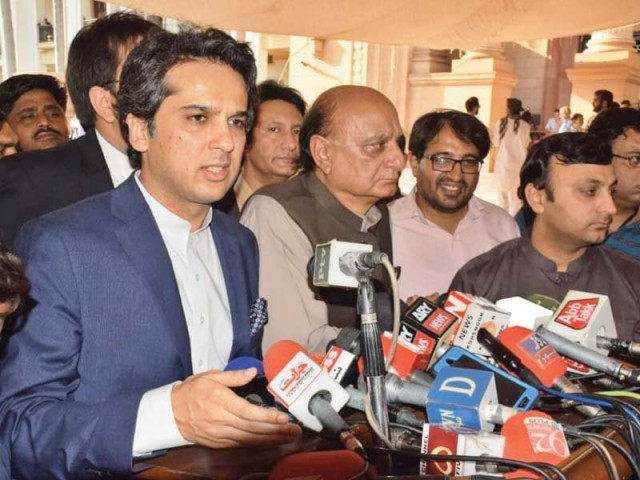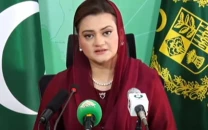ADP jumps up 47% to hit Rs350 billion
Around 36% is likely to be spent on social sector development

Provincial Finance Minister Hashim Jawan Bakhat talks to the media after presenting Punjab Budget 2019-20 in the assembly. PHOTO: NNI
Budget documents highlight that the government plans to shift its focus from infrastructure to human capital development.
Social sectors
The government has proposed 36% of the total ADP, amounting to Rs124.9 billion, for social sector development, including Rs46.9 billion for education, Rs32 billion for school education, Rs7.3 billion for higher education, Rs1 billion for special education, Rs2.6 billion for literacy and non-formal basic education and Rs4 billion for sports and youth affairs.
Similarly, Rs47.5 billion has been proposed for health and family planning, including Rs23.5 for primary and secondary healthcare, Rs22 billion for specialised health and medical education and Rs2 billion for population welfare.
Focus on south Punjab in Rs2.36 trillion budget
Punjab government has also proposed Rs22.4 billion for water supply and sanitation, Rs1 billion for social welfare, Rs800 million for women development as well as Rs6.3 billion for local government and community development.
Infrastructure development
For infrastructure development, the provincial government has proposed an allocation of Rs87.7 billion or one-fourth of total development funds, which includes Rs35 billion for roads, Rs23.4 billion for irrigation, Rs6 billion for energy, Rs9.8 billion for public buildings and Rs13.5 billion for urban development.
Production sectors
Budget documents highlight that the government has proposed 10% of the ADP, or Rs34.5 billion, for production sectors, including Rs15.5 billion for agriculture, Rs3.43 billion for forestry, Rs520 million for wildlife, Rs1.05 billion for fisheries, Rs500 million for food, Rs3.5 billion for livestock and dairy development, Rs7.5 billion for industries, commerce and investment (including skills development), Rs1 billion for mines and minerals and Rs1.5 billion for the tourism sector.
Services
A sum of Rs20.6 billion has been proposed for the services sector, which is nearly 6% of the total development program. Budget documents show that the government has proposed an allocation of Rs6 billion for governance and IT, Rs300 million for labour and human resource development, Rs13.5 billion for transport and mass-transit and Rs800 million for emergency services (1122).

Other sectors
For other sectors of the provincial economy, the government has proposed around 5% of development funds (Rs16.95 billion). A sum of Rs1 billion has been proposed for environment, Rs300 million for information and culture, Rs350 for archaeology, Rs300 million for auqaf and religious affairs, Rs1 billion for human rights and minority affairs and Rs14 billion for planning and development and Punjab Skills Development Fund (PSDF).
Special initiatives
The government also announced Rs63.35 billion worth of special programs in its budget statement for financial year 2019-20, which include Rs50.35 billion for special programmes and initiatives as well as Rs15 billion for community development programmes.
Major projects
Budget documents show that the government has decided to expand the health insurance programme to all 36 districts of Punjab in the upcoming fiscal year. A sum of Rs15 billion has been earmarked for Rural Accessibility Programme (Phase-I) and Rs2 billion for Punjab Arterial Roads Improvement Programme.
A skill development programme for youth, called Huner and Nojawan, is being started with an aim to increase training capacity from 90,000 to 150,000 per annum. Construction of Mir Chakar Khan Rind University of Technology in Dera Ghazi Khan has also been proposed.
Similarly, Rs1 billion has been earmarked for the construction of Angoori Dam, which has an estimated cost of Rs4 billion. The construction of Manga Dam is estimated to cost Rs1.1 billion and Rs300 million has been earmarked for FY 2019-20. Meanwhile, Rs1 billion has been earmarked in the upcoming fiscal year 2019-20 for the construction of Ghambir Dam which is estimated to cost Rs6.5 billion.
For the construction of a building at the University of Okara, Rs300 million has been allocated. In addition, the National Programme for Improvement of Watercourses in Pakistan Phase-II is estimated to cost Rs18.3 billion. Also, the National Programme for Productivity Enhancement of Wheat in Punjab is estimated to cost Rs9,137 million and the National Oilseed Enhancement Programme is to cost Rs2 billion. For the latter, Rs208.6 million has been allocated for this year 2019-20.
The Productivity Enhancement of Sugarcane is estimated to cost of Rs 744 million and Rs432.8 million has been allocated for FY 2019-20. There is also the National Programme for Enhancing Profitability through Increasing Productivity of Rice at an estimated cost of Rs4.6 billion.
Other major projects include the construction of Sheikh Zayed Medical Complex, along with a 1,250-bedded hospital, in Rahim Yar Khan at an estimated cost of Rs6 billion for which Rs1.152 billion has been allocated in the budget.
In addition to this, the Population Welfare Programme has been allocated Rs 1.908 billion for FY 2019-20. Also, the construction of an additional bridge over River Indus at Ghazi Ghat on N-70 (District DG Khan) will receive funding worth Rs 629 million.
The construction of a dual road to connect Faisalabad to Lahore -Multan Motorway will receive Rs 1.14 billion in FY 2019-20 against an estimated cost of Rs3.812 billion.
Under the project Progressing Punjab by Entrepreneurial Development of SMEs, 3,000 SMEs will be developed and 45,000 direct employments will be generated. Also, the completion of the Lahore Orange Line Metro Train Project is on the cards with the establishment of 39 vehicle inspection and certification stations in Punjab.
Published in The Express Tribune, June 15th, 2019.



















COMMENTS
Comments are moderated and generally will be posted if they are on-topic and not abusive.
For more information, please see our Comments FAQ